Reprising a dream

Approximately 2,000 people filled the seats of the Sun Dome on Thursday as the Rev. Jesse Jackson related a number of firsthand experiences and anecdotes concerning the life and work of Martin Luther King Jr. while expressing his views on the current state of American culture.
Jackson’s speech capped a weeklong celebration at USF commemorating the life of King, with whom Jackson worked from the early 1960s until King’s death in 1968.
Before Jackson took the stage, Vice President of Student Affairs Jennifer Meningall orchestrated a moment of silence in memory of former USF football player Keeley Dorsey, who died Wednesday during a routine workout. Jackson also honored the fallen student by opening with a prayer for his family.
Though the event opened on a somber note, Jackson kept the attitude serious but light for the remainder of his appearance.
“You can’t have the right to take off King Day or King week and not be rich,” Jackson said.
According to Jackson, King worked on his last birthday organizing a multicultural march on Washington to help end poverty in America. King also discussed the Vietnam War, forgetful of his birthday until members of the group brought a cake and punch into the room.
Recognizing the “I Have a Dream” address as the high point of King’s career, Jackson emphasized his belief in the importance of putting the speech into historical context. He did this by calling the “dream” a broken promise, citing the Emancipation Proclamation as Abraham Lincoln’s promise to blacks.
“We got the emancipation, but not the proclamation,” he said. “The dream is the struggle for equal protection for all people. It is the struggle for racial justice and gender equality and workers rights – the right to make a difference.”
Jackson continued by relating affirmative action to the world of sports, praising black athletes and National Football League coaches Lovie Smith and Tony Dungy. He commended professional sports for their diversity and equality, while emphasizing that even fans cheer for players regardless of race or creed.
“If on the football field blacks had to run 12 yards for a first down or whites had to run seven yards because they inherited some yards, we would be fighting for football,” said Jackson while explaining the need for affirmative action.
As a politician, Jackson broke new ground for black Americans by running for president twice. He also negotiated the release of American prisoners of war in Kosovo and was involved with the Clinton administration as a special envoy of the State Department.
His experience in politics was reflected as he chanted with the audience, “stop the war” and praised USF for its focus on globalization, celebrating what he called “the beauty of this University’s universality in its diversities.”
“You can’t be educated and look at a map and not at the globe,” he said.
Throughout his address, Jackson emphasized the importance of voting and criticized Florida’s current voting regulations. Toward the end of his speech, he called any unregistered voter to the front.
As about 200 people gathered, Jackson said, “In most states I go to, I could register you to vote right now. In Vermont and Maine you could register to vote today … but not in Florida. Tonight I can pass you an envelope, I can pass you the cards to register but I can’t register you here. That’s designed to cool your passion for voting and fighting back. If Dr. King can die about it and Mandela can go to jail about it, then you can register to vote and fight back about it.”
Jackson ended his presentation by having the audience repeat with him, “We as people, red, yellow, black and white must not limit our dream, we must dream bigger than our circumstances.”





